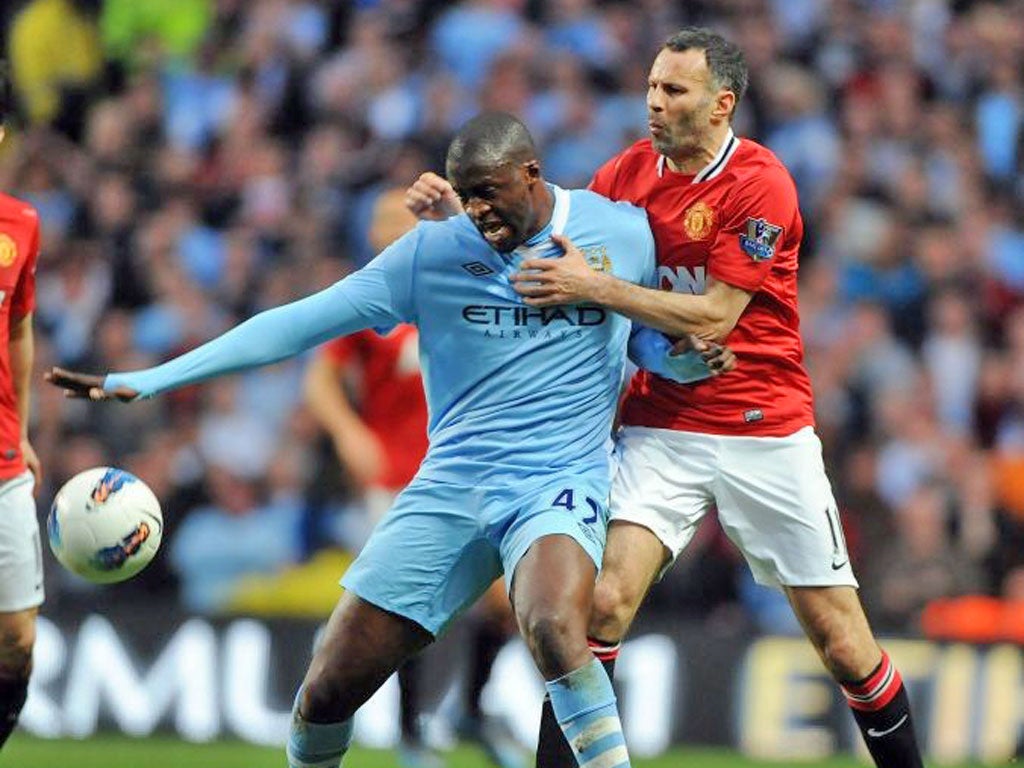James Lawton: Manchester City show the nerve and the verve to herald a power shift
Last night's victory over Manchester United saw City looking increasingly equipped to achieve a new piece of football history

In the end it was too hard and too unyielding for any glowing and definitive statement from champions-elect but we could say something of significance indeed of Manchester City when they took a massive stride towards the championship of England after a break of 44 years.
We could say that on the most important night of their football lives they looked a team who were more than enough to beat the team who have set the standards of professionalism and unbreakable ambition in this football land.
They won, deservedly, and in the taut process they showed a depth of talent and resolve upon which it is entirely reasonable to believe they can build.
Maybe they will also put behind them the sense of a team too easily disrupted by a shortfall in discipline, but for the moment that is another chapter, another challenge.
Last night they met the one that pressed on them so heavily as well as anyone could have expected. There are a couple more left and most difficult is the one that faces them at Newcastle at the weekend. In 1968 they won there, gloriously, for their last title.
As last night wore on, City looked increasingly equipped to achieve a new piece of football history.
United came out bristling with Sir Alex Ferguson's assertion that his is not a team you can programme for a draw. It is not in their DNA and still less their guts. You would probably have as much chance of success hunting with poodles.
So, with the old men Ryan Giggs and Paul Scholes scampering like still eager boys, United laid siege to the City goal. Joe Hart found it necessary to deliver a lecture to his fellow defenders.
However, the problem for a United pursuing their 13th Premier League title was that when City woke up they did so with such dazzling accomplishment that Diego Maradona, Sergio Aguero's father-in-law, was inspired to leap from his seat.
It was the start of a tide of superior aggression in which Yaya Touré was at times simply immense.
Near half-time he injected himself into a flowing move which also involved Pablo Zabaleta, Carlos Tevez and Aguero and when United scrambled a corner there was an inevitable conclusion along with the intake of breath. This said that however hard United laboured to obscure the reality, City had the potential to move on to another level.
Instead, for the moment at least, they merely drilled in a set-piece goal which saw City skipper Vincent Kompany not so much beating Chris Smalling to David Silva's corner as delivering a brief but unforgettable seminar on losing a marker and making him pay.
At this pivotal moment you couldn't be sure of the cost to United. What you could say, though, was that Roberto Mancini's faith in the full range of his attacking strength – and with Mario Balotelli lurking on the bench – had met with some entirely just reward. Whatever Ferguson said at half-time he could not begin to dispute the fact that for so much of the first half only one team had looked convincing in the mantle of champions.
What could he say? It was surely the old mantra that surrender has no place in the make-up of his team. It's a fine and noble theory and it has played a huge part in United's unprecedented success in English football, but sometimes of course you need rather more. In this case, it was an early admission that the decision to leave out Danny Welbeck in favour of the combative Ji-sung Park had plainly not worked. Welbeck appeared early in the second half but inevitably in the circumstances there were other doubts.
Not least among them was concern over the legs of Scholes and Giggs and it was a worry intensified by the sight of Aguero sweeping by the former with barely a sideward glance. Yet it is true enough that United remain one of the serious football teams least inclined to run up the white flag. Scholes scuffled on, as he would, and if United struggled to produce many sparks of creativity they did check the stream of City attack sufficiently to persuade Mancini that it was time for a little compromise.
He took off a Tevez who was never less than waspish – as befitting a man who had just declared that he was ready to remake his rumpled Manchester bed and contemplate an extended stay in the city about which he has been sometimes less than flattering – and brought on Nigel de Jong.
Whether it was mere prudence or something of a reversion to cautious type, was a point that probably needed some greater reflection – the kind that always comes when the result is in.
Ferguson and Mancini made their own not inconsiderable contribution to the tension after De Jong brought down Welbeck. Their touchline debate was explosive but no more laden with edge than events on the field.
Ferguson retreated quickly enough because he knew in his bones that this was a night when the most important argument was almost certainly lost.
Subscribe to Independent Premium to bookmark this article
Want to bookmark your favourite articles and stories to read or reference later? Start your Independent Premium subscription today.

Join our commenting forum
Join thought-provoking conversations, follow other Independent readers and see their replies
Comments